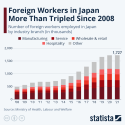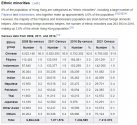Japan is scrambling for solutions for increasing its labor force, but does anyone here actually believe the amount of migrant workers or its society will ever reach a point where the nation could be called "multicultural"?

The number of foreigners working in Japan has reached a new high of almost 1.7 million in 2019. After years of slow growth in the number of foreign workers admitted into the country, Japan has increased its efforts to attract them in the past couple of years.the Japanese government is feeling the need to bring in talent from abroad.
Immigrants, mainly from developing Asian countries, but also from the West, are now coming to Japan in larger numbers. Since 2014, the number of foreigners working in Japan has more than doubled, (link in Japanese). The Japanese government revised immigration and refugee recognition laws in early 2019 with the aim of accepting an additional 340,000 workers to the country. Some special provisions were also taken to attract nurses, restaurant workers and laborers. In December of 2019, Prime Minister Shinzo Abe und his cabinet had already adopted measures to foster the coexistence of Japanese and foreign nationals that came at a price tag of US$55.3 million.
In the light of all this, it appears the country is indeed serious about a more multicultural future. Still, this new vision of Japanese society might be a hard sell: The measures adopted have drawn some controversy and have even led to kerfuffles during parliamentary debates. Right-wing politicians slammed the reform saying it would bring in crime and destroy the homogenous Japanese society.


